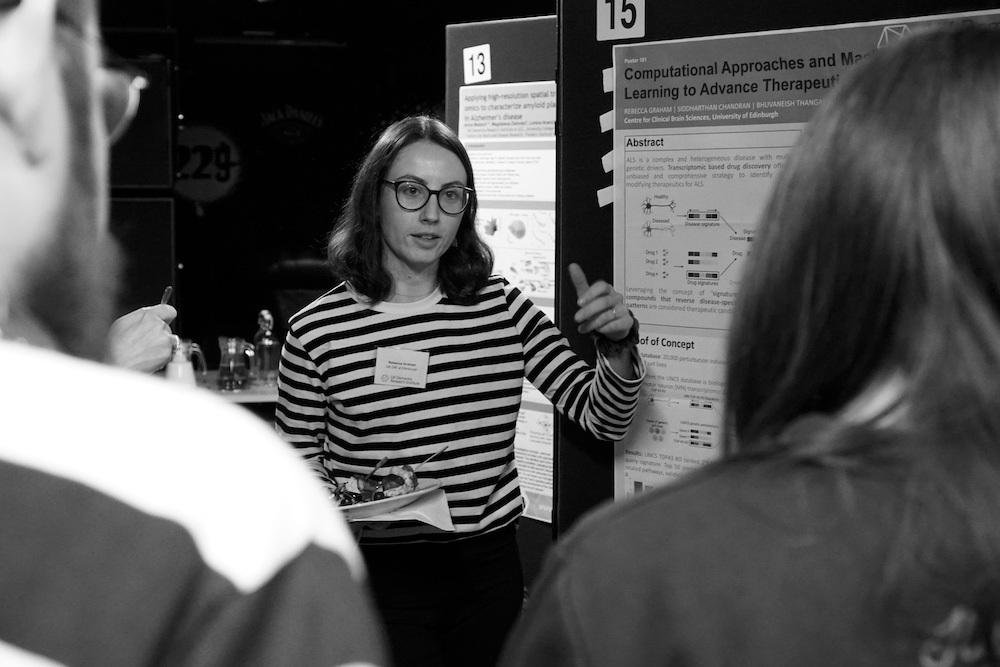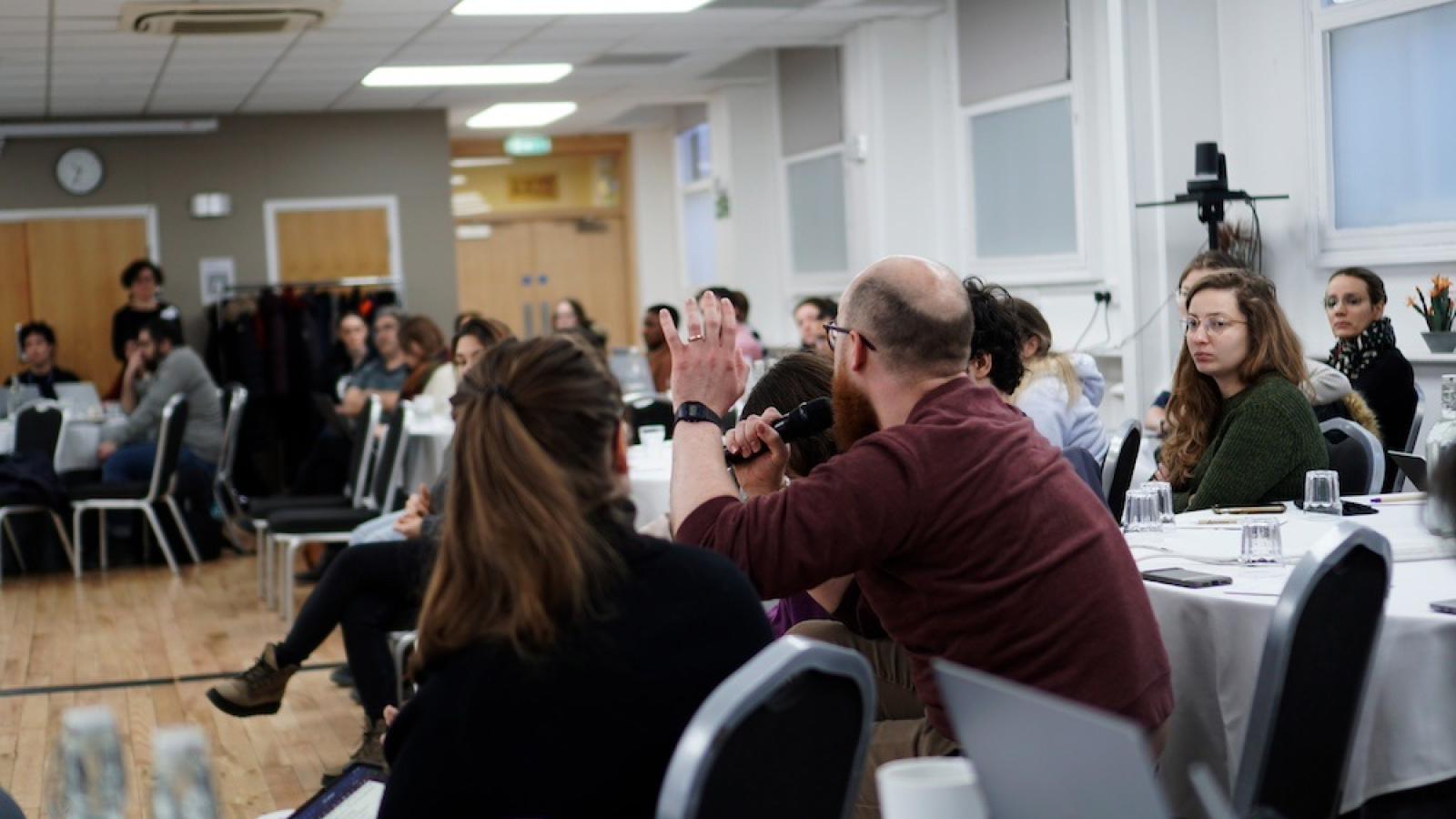Advances in computational methodologies for the investigation of high-throughput biological data are coming at a lightning pace, and UK DRI researchers across the Institute are harnessing these opportunities to fast track discovery. But challenges remain in how to share data, expertise and code across such an expansive network.
For the first time, early career researchers (ECRs) using informatics approaches from across the seven UK DRI Centres congregated in central London for two days to hash out solutions to these challenges through an exciting mix of talks, discussion and practical workshop.
“Progress in science depends on new techniques, new discoveries and new ideas, probably in that order.” - Sydney Brenner, Winner of the 2002 Nobel Prize in Physiology or Medicine.
It’s all in the details
Presentations at this event were a little different compared to other UK DRI events. Speakers and poster presenters were encouraged to focus on the statistical, technical, and computational methods that are normally glossed over in scientific talks.
Dr Sarah Marzi, Group Leader at the UK DRI at King’s, said:
“The UK DRI ECR informatics symposium was a brilliant opportunity to delve deeper into the statistical and computational approaches underlying our research. As far as presenting goes, this was entirely different from my normal conference talks. I had to think very carefully about putting together a talk that highlights core mathematical principles underlying some of the most impactful methods used in quantitative genomics and what makes them so successful.”
Sam Keat, a PhD student from the UK DRI at Cardiff, said:
“At most meetings, the talks are about things that took years to optimise and would take many months to set up in a lab, but here, I can hear something interesting and use it in my research immediately.”
Sharing is caring
Reproducibility, sustainable software development, and empowering data sharing were high on the agenda throughout the event. Dr Mateus (Gabriel) Bernardo Harrington led a series of discussions, and UK DRI Associate Director of Informatics Dr Amonida Zadissa outlined her vision for an idealised project workflow incorporating use of the UK DRI GitHub (https://github.com/UKDRI), registered reporting, Alzheimer’s Disease Data Initiative (ADDI) Workbench and other tools such as Nextflow, Docker and Zenodo.
Attendees tested out the ADDI Workbench for themselves in a hands-on workshop delivered by the ADDI team. The AD Data Initiative team said,
“The Alzheimer’s Disease Data Initiative was pleased to have supported and participated in this important workshop in partnership with our colleagues at UK DRI. This collaborative workshop and demonstration of analytical tools/capabilities exemplifies our joint dedication to empowering researchers and advancing breakthroughs in dementia research through data sharing and global collaboration.”
Amer Marzuki, a software developer based at the UK DRI Centre for Care Research & Technology, shared his best working tips for professional-grade software development, drawing on his experiences working on the Minder smart-home project, where live code deployments must be handled with the utmost care, so as not to impact the lives of patients living in the smart-home.
Are small molecules the future of dementia drugs?
CEO of Serna Bio, and recent addition to the UK DRI Board of Trustees, Dr Rabia T. Khan, closed the conference with a rousing talk, drawing on her numerous experiences both in academic science and business, as well as her youth in Pakistan. Rabia explained that her company's focus on small molecules, as opposed to biologics, was rooted in her desire for the drugs of tomorrow to be cheap and widely accessible across the globe, not just to the richest one percent.
In this same vein, Dr Rebecca Graham, CSO Early Postdoctoral Fellow at the UK DRI Edinburgh, won the audience-selected ADDI Best Poster Prize for her work screening massive numbers of small molecules to look for a reversal of disease signature in models of Motor Neuron Disease. She explained that “studying how drugs affect diseases at the transcriptome level may highlight new opportunities for small molecules in dementia".

of the ADDI sponsored Best Poster Prize Dr Rebecca Graham (Postdoc, UK DRI Edinburgh) presenting her work developing an innovative drug discovery paradigm for Motor
Collaboration is key
The audience-selected best talk prize went to Dr Anna Mallach for her work on spatial transcriptomics, a field where cutting-edge biology comes together with state-of-the-art informatics. She emphasised how close collaboration between biologists and informaticians was critical for getting the most out of this new technology.
Altogether, the meeting highlighted how the pairing of novel experimental methods with the latest informatics techniques are driving developments across the Institute. By facilitating the sharing of code, data and expertise between researchers we can maximise the opportunity for dementia breakthroughs.
Written by Charlotte Capitanchik and Steve Hill, with input from Christina Maat and Amonida Zadissa.
Photographs by Charlotte Capitanchik and Amonida Zadissa.
Article published: 12 February 2024
